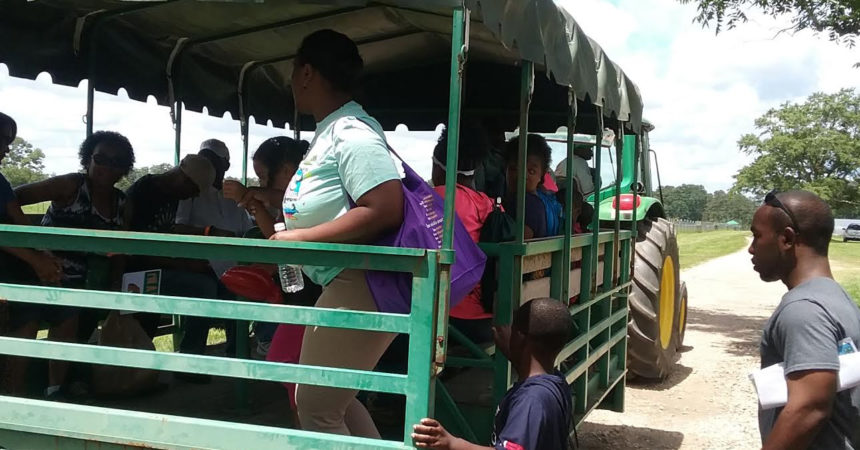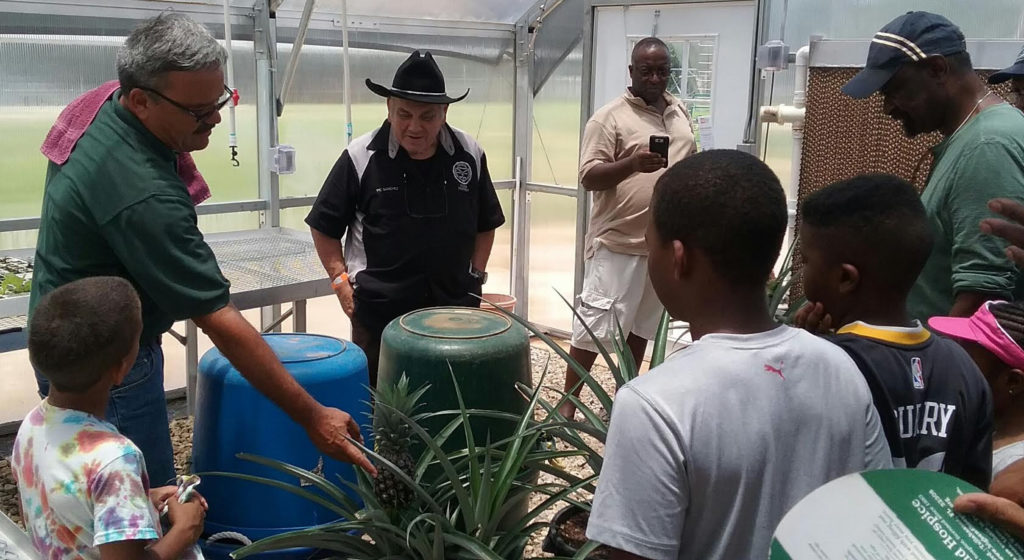
FAMU Farm Fest turns into a growing experience

Alex Bolques, director of FAMU’s Research and Extension Center in Quincy, demonstrates how hydroponics help pineapple plants thrive indoors.
Photo by St. Clair Murraine
By St. Clair Murraine
Outlook staff writer
Daphnee Lisa had an experience at the farm where FAMU runs its Cooperative Extension Program in Quincy that she drove four hours for.
Being at the FAMU Farm Fest this past Saturday was that important to her and her two friends for them to take the more than 200-mile journey. They drove from Mableton, Ga., just to attend the annual event that drew hundreds this year.
“I like the feeling of connecting with nature and the feeling of picking my own food,” Lisa said. “It makes me happy.”
A native of St. Martin in the Caribbean, she said being on the farm brought back memories of a common lifestyle in her country.
“I’m from an island and this is what we do,” strolling through rows of bell peppers and strawberries. “We grow our own fruits and vegetables (and) I like doing stuff like that.”
Many of the visitors weren’t as fortunate as Lisa to have grown up with farming. That’s one reason the Farm Fest is important, said FAMU interim president Larry Robinson.
“What you see here today is an example of what extension is all about at FAMU,” Robinson said. “People are coming here to learn from us about how to do things better when it comes to agriculture.”
Robinson acknowledged that this generation has missed what those like Lisa knows about growing up on a farm or even producing their food in the backyard.
Take for example Jayland John, a seventh-grader who was one of 21 boys brought to the event by the 100 Black Men Tallahassee chapter. He said he had no idea where milk came from until he saw a balloon simulation of how a cow produces milk.
The boys’ trip was of a life skill enrichment that the 100 Black Men have them participate in twice each month, said Col. Ronald Joe, who supervised the boys.
Robinson praised the organization’s initiative to bring the boys to the Farm Fest.
“It’s important for those young people; not only to connect with (knowing where milk comes from) but also to understand the sophistication with regards to the science and technology associated with today’s agriculture,” he said. “There is a lot to this agricultural arena that’s both fundamental and at the cutting edge.”
Several of the visitors on the 232-acre farm got a taste of everything they wanted to know about growing their own food. They even had the opportunity to participate in informative conversations with workers on the farm.
An entertainment section was cordoned off for children to play and adults had a choice of vendors offering roasted corn and drinks.
Coordinator Renysha Harris didn’t skip a beat, trying to answer visitors’ questions while handling ongoing logistics.
What unfolded on the farm in Quincy took about three months of planning, Harris said.
“It’s a whole lot of energy. It gets bigger, bigger, bigger,” she said. “We come up with ideas and decide what we want to showcase to the community; how we are going to make it interactive, fun and educational.”
There was plenty to learn. Visitors had a choice of touring the farm in a trailer or walking through the many sections, where they were allowed to pick from the fruits, vegetables and herbs.
Alex Bolques, director of the farm, was one of the people offering lessons on some of the science involved in farming today.
The question asked the most was about the growing by hydroponics means. The method of growing plants in a water based, nutrient rich solution fascinated most of his audience.
Using hydroponics instead of soil, allows farmers to grow many different plants in a controlled environment. Tropical plants grow better in a hydroponic setting, Bolques said.
Food like pineapples and avocados are among the plants that struggle to grow in northern temperature without being in a controlled envoronment.
“You cannot make tropical plants grow in a northern environment unless you provide some protection for it,” he said. “You will (not) be able to get fruits from it if the environmental conditions are not suited for it.”
Goliheh Davis, a regular at the Farm Fest, said he was motivated to start growing some of his food after his first visit a few years ago.
He said he gets a takeaway of something new each year.
“It’s good to sit down at some of the seminars and learn about hydroponics,” he said. “Before I came here, I knew what hydroponics was but I didn’t realize that there were many different types.”







